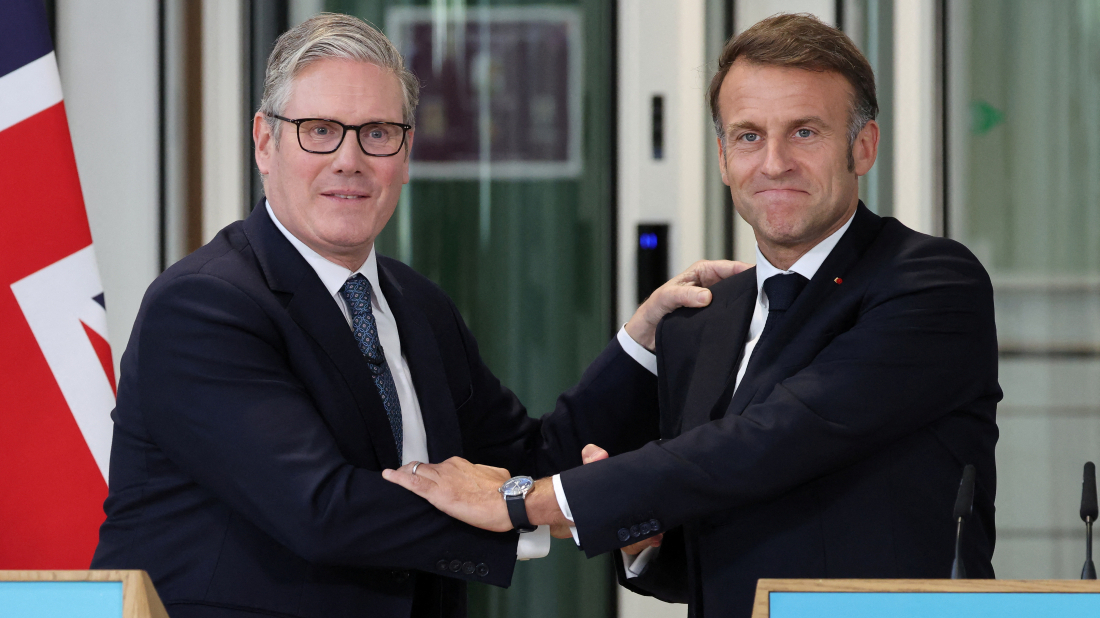Iran designates EU naval and air forces as ‘terrorist entities’ in reciprocal move
Iran announced on Saturday that it has designated the naval and air forces of European Union member states as “terrorist entities” in a reciprocal...

British Prime Minister Keir Starmer led a virtual meeting which included over 30 international leaders on Tuesday morning of what is known as ‘coalition of the willing’.
In the meeting, he updated the parties on the outcome of peace talks in Washington on Monday night with regards to Ukraine and Russia.
He also outlined next steps which include planning further meetings with US counterparts and focusing on plans to deliver robust security guarantees in the event of a ceasefire.
There were also discussions on the possibility of further pressure on Russia - through sanctions to persuade a more serious commitment to ending the war from President Putin.
Who is the ‘Coalition of the willing’?
The term “coalition of the willing” has loosely come to mean a temporary alignment or union of countries to achieve a common goal, typically military or political in nature.
It was first used by President Bill Clinton in 1994 at the height of an international stand off with North Korea over its nuclear activities.
It was then used again by President George Bush in 2002 as he rallied for support for the US-led Multi-National Force which invaded Iraq in 2003 invasion.
Much more recently, a new coalition of the willing has been formed to include thirty one countries who have pledged unwavering support for Ukraine against Russian aggression.
The “coalition” and the Russia - Ukraine war
Earlier in the year, in March, Czech President Petr Pavel called for the formation of a coalition of the willing to end the Russian invasion of Ukraine in a post made on X.
This was followed by British Prime Minister Keir Starmer repeating the sentiment after an International summit of European leaders hosted in London to garner support from Ukraine.
Since then, the UK and France have spearheaded efforts as “the coalition of the willing” in ending the war in Ukraine.
Since its formation, the coalition has held up to five high level meetings and one virtual meeting in London, Kyiv and France respectively.
Starmer broke down the major objectives of the meeting into four key points:
Commitment to maintaining the flow of military aid to Ukraine while increasing economic pressure on Russia through sanctions and other measures.
Affirming that any lasting peace agreement must ensure the sovereignty and security of Ukraine, with Ukraine being present at all peace negotiations.
Pledging to enhance Ukraine's defensive military capabilities following any peace deal to deter potential future invasions.
Development of a "coalition of the willing" consisting of multiple countries prepared to defend the terms of any peace agreement and guarantee Ukraine's security afterwards.
Since then, moves have been made to set up a joint peace keeping force to be deployed to Ukraine in the event of a ceasefire.
What countries are involved?
Countries included in the current coalition include UK, France, Ukraine Belgium, Bulgaria, Croatia, Cyprus, the Czech Republic, Denmark, Estonia, Finland, Germany, Greece, Iceland, Ireland, Italy, Latvia, Lithuania, Luxembourg, the Netherlands, Norway, Poland, Portugal, Romania, Slovenia, Spain, Sweden and Turkey.
The European Union and NATO are also non state parties to the coalition.
British Prime Minister Keir Starmer had mentioned Japan and New Zealand as part of the coalition, however both countries did not attend an all important meeting in Paris in March.
Quentin Griffiths, co-founder of online fashion retailer ASOS, has died in Pattaya, Thailand, after falling from the 17th floor of a condominium on 9 February, Thai police confirmed.
At least four people have died and 17 others were injured after a liquid gas truck overturned and exploded in Santiago, Chile’s capital, authorities confirmed on Thursday. Police said the driver was among those killed.
Cubans are increasingly turning to solar power to keep businesses operating and basic household appliances running during prolonged electricity cuts, as fuel shortages make diesel generators and other temporary solutions more difficult and costly to maintain.
Ukraine’s National Paralympic Committee has announced it will boycott the opening ceremony of the Milano Cortina 2026 Paralympics in Verona on 6 March, citing the International Paralympic Committee’s decision to allow some Russian and Belarusian athletes to compete under their national flags.
Eric Dane, the actor best known for his roles in 'Grey’s Anatomy' and 'Euphoria', died on Thursday, at the age of 53 after a battle with amyotrophic lateral sclerosis (ALS). His family confirmed his death after what they described as a “courageous battle” with ALS.
A technical fault in the helium system of NASA’s next-generation moon rocket was announced on Saturday, ruling out the planned March launch window for the Artemis II mission.
President Donald Trump said on Saturday (21 February) that he will raise temporary tariffs on nearly all U.S. imports from 10% to 15%, the maximum allowed under the law, after the Supreme Court struck down his previous tariff program.
Germany's ruling conservatives on Saturday (21 February) passed a motion to ban social media use for under 14s and introduce more stringent digital verification checks for teenagers, building momentum for such limits in Germany and elsewhere in Europe.
India and Brazil signed a mining and minerals cooperation pact on Saturday (21 February), as Prime Minister Narendra Modi said the two countries aim to increase bilateral trade to more than $20 billion within five years.
The Russian Defence Ministry claimed on Saturday (21 February) that its forces had captured another settlement in eastern Ukraine.
You can download the AnewZ application from Play Store and the App Store.

What is your opinion on this topic?
Leave the first comment